News
Trump honoring the Jan 6 attackers comes right from Hitler’s playbook

This past Saturday night—just days before the 4th anniversary of the Jan. 6 terrorist attack– Donald Trump held an event at his exclusive county club to honor one of the lawyers whose election fraud lies helped fuel the insurrection.
That was a despicable event—but not expected. After all Trump has followed Adolph Hitler’s playbook after his own failed coup to honor and celebrate those who helped him with his treasonous plot. And if history is a guide, by the 5th anniversary of Trump’s Jan 6 terrorist attack, we can expect Trump to have created a national day of remembrance to honor the sacrifice of the MAGA “patriots” who waged that deadly attack on our Capitol.
There is little originality when it comes to fascist tactics and propaganda. That is why what Trump has been doing to rewrite the Jan 6 attack as an “act of patriotism” was foretold to us by history—and Nazi history at that. In 1923, Hitler waged a coup known as the “Beer Hall Putsch” where he led several thousand of his supporters in an effort to violently overthrow Germany’s Weimar Republic. Among those who marched with Hitler included Hermann Göring, Heinrich Himmler, Rudolf Hess and others who would later serve in very visible positions in the Nazi regime.
Hitler’s plot led to a clash with the Munich police that left 14 Nazis and four police officers dead—and scores of both injured. Hitler was arrested and served less than one year in prison where he wrote “Mein Kampf” and plotted his return to power. After Hitler’s release from jail, he saw the benefit of celebrating the so called “martyrs” of the coup as a way to rally supporters. Hitler even utilized a flag from the attack that had been stained with the blood of his supporters—known as the “Blood flag” –as a powerful piece of propaganda at Nazi events.
Once Hitler became Chancellor of Germany in 1933, he honored those killed by the police in his coup attempt with an annual event known as “Reich Day of Mourning.” And the city square where the Hitler’s loyalists had clashed with police became a key memorial for the Nazi Party. It was only after World War II did the German Federal Republic dedicate a plaque memorializing the four police officers killed in defense of the Weimar Republic.
In the case of Trump– after first attempting to claim Jan. 6 was carried out by Antifa—he embraced Hitler’s playbook of celebrating the Jan. 6 attackers, sensing that this would help him excite the MAGA base. Less than a year after Jan 6, Trump began to make his supporter Ashli Babbitt–who was killed by a police officer when she jumped into a secured area against the officer’s command–into a martyr for the MAGA cause. Trump—just ten months after the Jan 6 attack–recorded a personal message for the Babbit family declaring, “There was no reason Ashli should’ve lost her life that day.” He added, “We must all demand justice for Ashli and her family, so on this solemn occasion as we celebrate her life.” Afterwards, Babbitt’s mother shared in an online video how Trump had personally caller her and that, “He said he talks about Ashli and he thinks about Ashli and that he has her on his heart.” That of course overjoyed MAGA core supporters who had already been celebrating Babbitt.
From there, Trump leaned into honoring the attackers who brutally beat up police officers—injuring more than 140–with four officers committing suicide in the months that followed. Trump hailed the MAGA terrorists at his rallies as being “great patriots” and “hostages.”
In 2023, Trump welcomed a fundraiser for the Jan. 6 attackers at his country club where he slammed the prosecution of the attackers. He told the audience, “You have firemen, you have teachers, you have electricians, you have great people, and they’ve been made to pay a price.” He even personally donated money to the cause.
One of the most traitorous displays by Trump was his recording of a rendition of the national anthem with Jan 6 attackers who were in prison for savagely beating up police officers. This song titled, “Justice For All”—and produced by Trump’s pick to head the FBI, Kash Patel— includes as singers, Ryan Nichols who pled guilty to assaulting law enforcement officers and was sentenced to more than five years in prison. Others singing include Shane Jenkins who was convicted of seven felonies, including assaulting law enforcement with a deadly weapon and was sentenced to seven years in prison.
And it’s this song that Trump kicked off many campaign rallies with an announcer asking the crowd to “please rise for the horribly and unfairly treated January 6 hostages,” followed by the song being played. This is no different than Hitler’s use of the “Blood Flag”—but in this case Trump is celebrating MAGA terrorists he knows were the tip of the violent spear who attacked the police in his name.
These are just some of those involved in the Jan 6 attack that Trump has vowed to pardon in the “first hour” of his term. That is a point he reiterated during the campaign—including specifically promising to pardon those who beat up police officers. While two-thirds of Americans oppose such pardons, nearly 70% of Trump supporters favor them because like Trump, they view those people who used violence to help Trump remain in power despite losing the 2020 election as “patriots.”
I noted earlier that it wasn’t until the post-World War II German government came to power that a plaque honoring the four police officers killed by the Nazis during Hitler’s coup was installed. Well in the case of the officers injured on Jan. 6 by MAGA terrorists, Congress approved in 2022–when Democrats controlled the House and Senate–a permanent plaque honoring officers who protected the Capitol that day. By law, that plaque was to be installed by March 2023.
But then the GOP took control of the House in January 2023 and guess what? No plaque has been installed despite it being constructed already. When the press has asked Speaker Mike Johnson why the delay, they get a runaround. But we know the reason: To Trump the police are the bad guys, the attackers are the heroes. Thus, the House GOP has blocked the plaque to make their “Fuhrer” happy.
All of this is why I can say that by next Jan. 6 we can very likely expect Trump to use the day to honor the “patriots” of his attempted coup. After all, that is exactly what Hitler did.
News
“I think yes”: Biden believes he would have won election over Trump had he stayed in the race

When asked if his health would have held up to four more years of the presidency, Biden said “Who the hell knows?”
President Joe Biden thinks he had the juice.
The outgoing president speculated that he would have beaten President-elect Donald Trump a second time had he stayed in the presidential race in 2024. In a wide-ranging interview with USA Today, Biden was adamant that he would have fared better than Vice President Kamala Harris but balked on whether he could have served for four more years.
“It’s presumptuous to say that, but I think yes,” Biden told the outlet when asked if he would have won in November. “When Trump was running again for reelection, I really thought I had the best chance of beating him.”
Biden was less confident about making it through a second term. He said he considered “pass[ing] the baton” because he “wasn’t looking to be president when I was 85 years old, 86 years old.”
“Who the hell knows?” Biden said when questioned directly about whether he would have held his hypothetical presidency through 2028.
Elsewhere in the interview, Biden speculated about how his presidency would be remembered and advocated for what he viewed as the strengths of his administration.
“I hope that history says that I came in and I had a plan how to restore the economy and reestablish America’s leadership in the world,” Biden said. “That was my hope. I mean, you know, who knows? And I hope it records that I did it with honesty and integrity, that I said what was on my mind.”
News
BREAKING: Mexican President Claudia Sheinbaum Claps Back After Trump Suggests Renaming Gulf of Mexico to “Gulf of America” with Bold Renaming Proposal of Her Own!
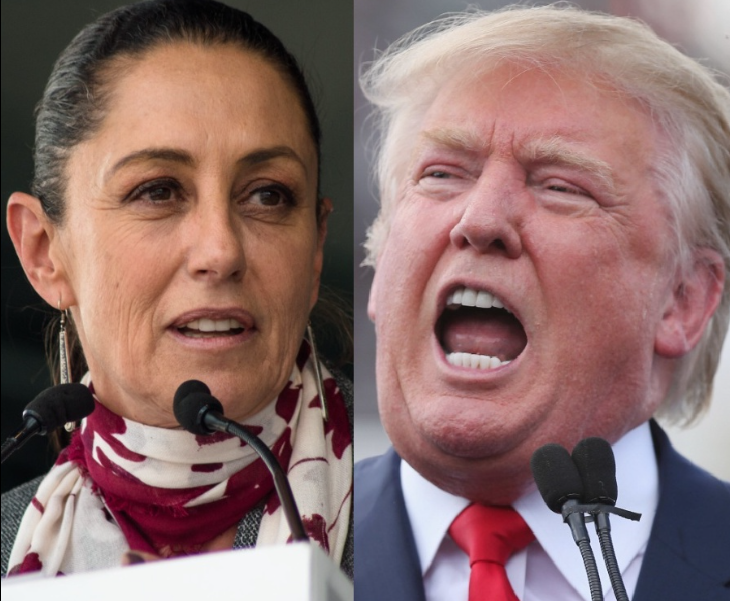
Mexican President Claudia Sheinbaum hits back hard after Donald Trump absurdly suggests renaming the Gulf of Mexico to the “Gulf of America” by suggesting some renaming of her own.
This is how you handle a man-child like Trump…
“I mean obviously, ‘Gulf of Mexico,’ the name is recognized by the United Nations, an organism of the United Nations. But next, why don’t we call it ‘Mexican America?’ It sounds nice, doesn’t it?” Sheinbaum said at a press conference.
She then waved at a map showing that North America was historically referred to as “Mexican America” before the rise of the United States.
“Since 1607 The Constitution of Apatzingán was for Mexican America, so we’re going to call it ‘Mexican America,’ it sounds nice, doesn’t it?” she went on. “And Gulf of Mexico, well, since 1607 and it’s also recognized internationally.”
Brian Winter, vice president of the Council of the Americas, praised Sheinbaum’s remarks—
“Humor can be a good tactic, it projects strength, which is what Trump responds to. It was probably the right choice on this issue,” he said.
“Although President Sheinbaum knows it won’t work on everything — Trump and his administration will demand serious engagement from Mexico on the big issues of immigration, drugs and trade,” Winter added.
Incidents like this reaffirm what a huge mistake the United States made be reelecting Trump. We are transitioning from stable, sane governance to the egomaniacal ravings of a reality TV star.
The world is laughing at us.
News
Trump’s trolling and tariffs sped up Trudeau’s demise. How will Canada handle him now?

Liberal Party infighting over Trudeau’s handling of the president-elect and his threat of tariffs dealt a final blow to the prime minister’s premiership. What now?
Canadians woke up Tuesday to an uncertain future, after Prime Minister Justin Trudeau said he would resign and bring his near-decade in power to an end.
Trudeau’s announcement came just days into an election year and followed weeks of mounting pressure from within his own party to step down as he battled dire poll ratings partly driven by soaring inflation, rising immigration and his handling of President-elect Donald Trump.
“If I’m having to fight internal battles, I cannot be the best option” in Canada’s next election, Trudeau, 53, told reporters in Ottawa.
His decision has triggered an urgent search within the Liberal Party to identify a new candidate who can take on Conservative leader Pierre Poilievre. Poilievre has dominated in the polls and was last on 44% according to the Canadian Broadcasting Corporation, compared with Trudeau — whose rating sits just above 20%.
The Trump factor
A key focus for whoever leads Canada next will be managing their country’s relationship with the incoming Trump administration.
After winning re-election in November, the president-elect vowed to impose a 25% tariff on all products imported from Canada and Mexico.
While Trudeau sought to appease Trump, visiting him at his Mar-a-Lago estate in Florida, the incoming president has since repeatedly jabbed at the prime minister, suggesting making Canada the 51st state and reiterating the idea in response to Trudeau’s resignation.
Trudeau’s handling of Trump precipitated the final blow to his tenure, with the high-profile departure last month of his Deputy Prime Minister and Finance Minister Chrystia Freeland. In a scathing resignation letter, she accused Trudeau of failing to take seriously Trump’s threats to increase import tariffs on Canadian goods.
Freeland warned that Canada needed to take Trump’s plans “extremely seriously” and avoid “costly political gimmicks.”
In contrast to Trudeau, Poilievre — the former-Conservative minister’s biography touts him as a “life-long conservative” and “champion of a free market” — has sought to present himself as the candidate with the “strength and smarts to stand up for this country.”
In an interview with Canadian broadcaster CTV News last month, Poilievre said that his first message for the incoming president was “that first and foremost, Canada will never be the 51st state of the U.S.” — and Canada, he said, had a “very proud future ahead of us.”
Tari Ajadi, a politics professor at McGill University in Montreal, was less sure. He told NBC News that Poilievre has yet to produce a clear plan on how to tackle the Canada-U.S. relationship under Trump, adding that “I think Canada’s in for a rough ride.”
What happens now?
Even though Trudeau is quitting, Canadians will have to wait for months before they can head to the polls.
An election date has yet to be announced, and while the Canada Elections Act says it must be held on or before Oct. 20, Trudeau’s resignation means it’s likely that a vote will be called before then.
Before that can happen, the Liberal Party must find a candidate. Trudeau said he would remain at the party’s helm until his party colleagues have undertaken a “robust, nationwide, competitive process” to find his successor.
In the meantime, Trudeau said Canada’s governor general had accepted his request to prorogue Parliament, suspending proceedings without the dissolution of parliament, until March 24. Then, a confidence vote is expected to be held, with a no-confidence result triggering the next federal election.
That means the Liberal government will remain in power, but parliamentary activity will come to a halt.
Referring to his party’s lack of working majority and Canada’s legislative gridlock, Trudeau said Monday that “Parliament has been paralyzed for months after what has been the longest session of a minority Parliament in Canadian history.”
Who will replace Trudeau?
Trudeau, a former teacher who campaigned with the slogan “sunny ways,” took office in November 2015 and enjoyed high popularity ratings early in his leadership with the promise of liberal reforms, progressive tax policies and a focus on gender equality.
His initial appeal was also boosted by the legacy of his father, the charismatic but polarizing Pierre Trudeau, who was one of Canada’s longest-serving leaders.
But in recent years, Trudeau’s approval ratings plummeted from around 65% in September 2016 to around 22% in December, according to the nonprofit Angus Reid Institute.
According to figures from the Angus Reid Institute, Freeland, a former journalist, is the Liberal candidate most likely to beat Poilievre.
Former Bank of Canada governor Mark Carney is also a contender, and the Conservatives have sensed that. They have long attacked Carney, with Poilievre dismissing him as “just like Justin.”
But regardless of who Trudeau’s successor is, “it’s hard to imagine anyone coming in who can hold on to the government in the next election,” Cornell University government professor Peter Loewen.
-

 News3 weeks ago
News3 weeks agoU.S. Military Service Is the Strongest Predictor of Carrying Out Extremist Violence
-

 Uncategorized3 weeks ago
Uncategorized3 weeks agoBREAKING: Kylie Kelce hits back hard after MAGA trolls swarm her with hatred for daring to dethrone Joe Rogan as the #1 podcaster in America.
-
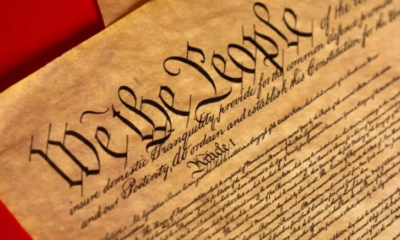
 News2 weeks ago
News2 weeks agoConstitutional Law expert: Trump will be an “illegitimate” President given he’s barred from office by 14th Amendment
-
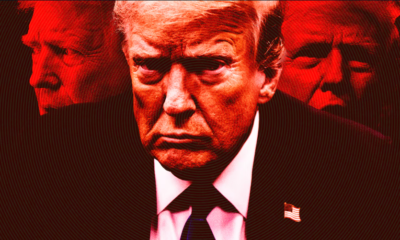
 News3 weeks ago
News3 weeks agoTrump Blames ‘Deranged’ Enemies for Hush Money Case in Posts
-

 News3 weeks ago
News3 weeks agoMerchan: Trump will be sentenced
-
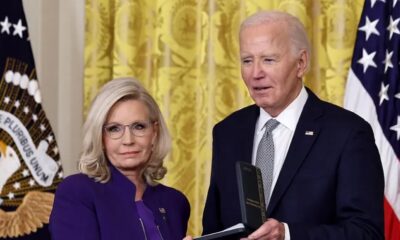
 News3 weeks ago
News3 weeks agoMAGA “offended” at Liz Cheney award
-
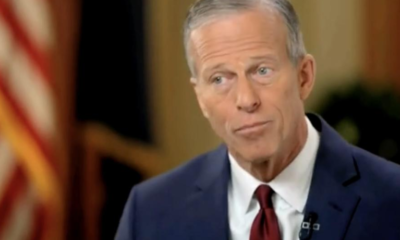
 News2 weeks ago
News2 weeks ago‘Is It Realistic?’: Top Republican Casts Doubt on Trump’s Deportation Quest
-
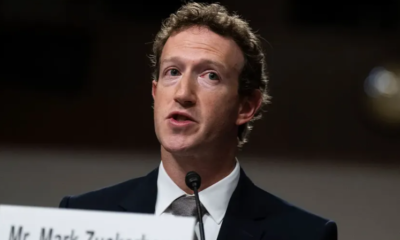
 News2 weeks ago
News2 weeks agoMark Zuckerberg tells Fox News that Meta will “get rid of fact checkers” in latest appeal to Trump






